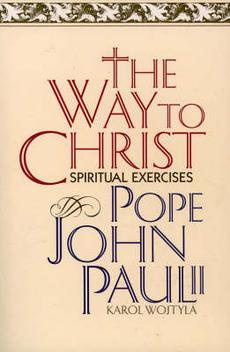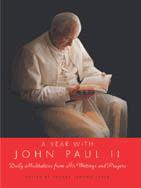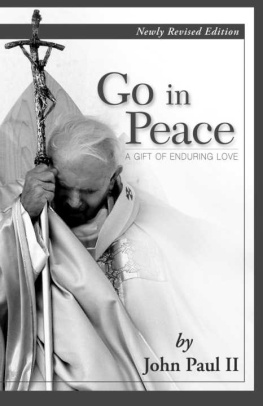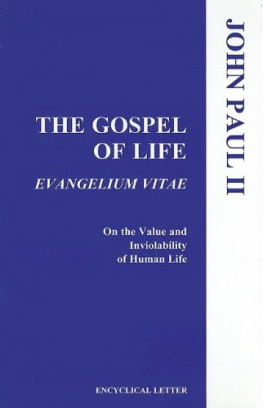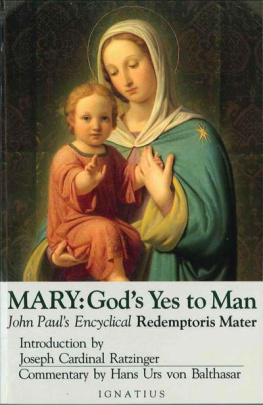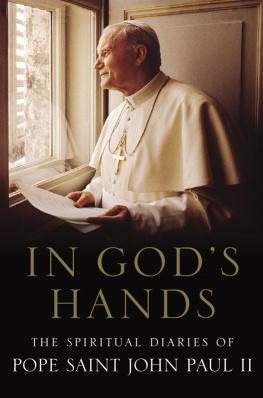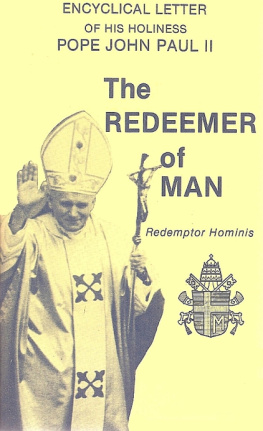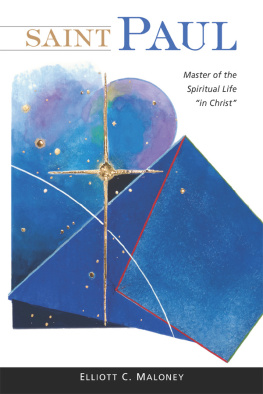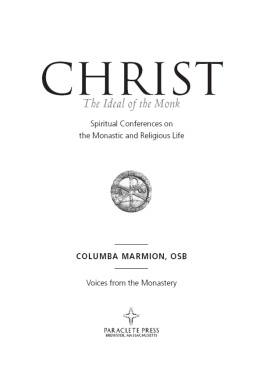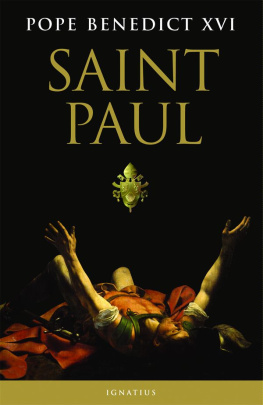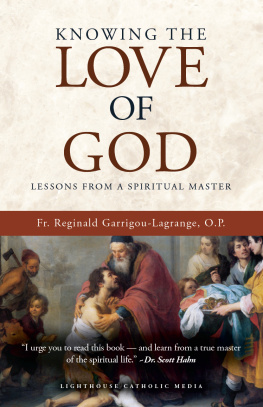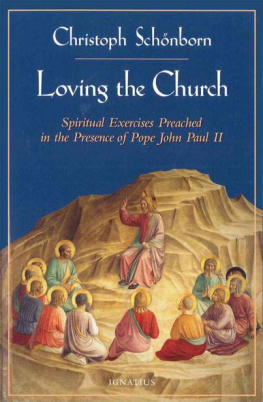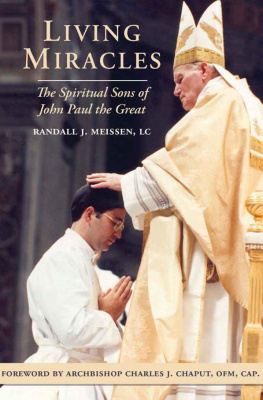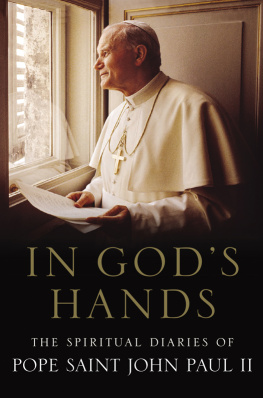THEWAY TO CHRIST
Spiritual Exercises
Pope John Paul II
Karol Wojtyla
Translated by LeslieWearne

This book wasoriginally published in Polish under the title Rekolekcje :Do Mlodziezy Akademickiej and then in Italian as Esercizi spirituali per i giovani . Copyright 1982 Libreria Editrice Vaticana , Vatican City.
the way to christ :Spiritual Exercises. English translation. Copyright 1984 by Harper & Row, Publishers, Inc. Allrights reserved. Printed in the United States of America. No part of this book may be used or reproduced in any manner whatsoever withoutwritten permission except in the case of brief quotations embodied in criticalarticles and reviews. For information address HarperCollins Publishers, 10 East53rd Street, New York, NY 10022.
first HarperCollins paperback edition publishedin 1994. ISBN 0-06-064216-5 ( pbk )
An Earlier Editionof This Book Was Cataloged Follows: John Paul II, Pope. the way to christ
Translation of: Rekolekcje , do mlodziecy akademickiej . 1. Spiritual exercises. I. Title. BX2187.P6J6413 1984 248.3 83-48426 ISBN 0-06-064204-1(cloth)
CONTENTS
Translator's Preface
PopeJohn Paul II's lifelong concern for the formation andeducation of the young is well known. The two retreats found in the presentvolume represent practical examples of this concern from the period immediatelyprior to the Second Vatican Council, when he was auxiliary Bishop of Cracow (1962), and from the immediately post- conciliar period, when he was Archbishop of the city andhad already been made Cardinal (1972).
Of course such pastoral work had becomeparticularly important in Poland because of the fact that the State had takenover the task of education, suppressing religious teaching in the schools anduniversities of the country, and aiming at the imposition of atheism in allareas of society and culture. However, the questions dealt with are of deepinterest to other societies as well: human dignity, the work ethic, thecondition of women, atheism, and so on. This volume can therefore be of help topeople who want to reflect once again, maybe in a slightly differentperspective from that with which they are familiar, on the practicalapplication and contemporary relevance of the fundamental truths of the faith.
These two retreats were preached in the oldchurch of Saint Anne, in the heart of the university section of Cracow . It should be remembered that they were not givenfrom written texts, but were tape-recorded on the spot and then transcribed bysome of the young people who flocked in increasing numbers to hear their bishopspeak. These transcriptions were then edited for the Polish edition (Do Mlodziecy Akademickiej ) by Father Andrzey Bardecki and Miss Irena Kinaszewska .In 1982 the Vatican Press published a re-edited Italian version (translated byFathers Carmelo Giarratana and Stanislaw Slabon ) under the title Esercizi spirituali per i giovani . The present English translation hasbeen made from the Italian version, although the longer Polish original hasbeen consulted on certain points.
In the first retreat, which I call "TheImage of God Within" (in the Italian version, "God, Man andReligion"), emphasis is placed on God's movement toward human beings tohelp them to rediscover, in their full human freedom, their original truth andgreatness; our turning to God and our witness before others are seen as the twoelements of our human response to this movement on God's part. (The word witness is a sort of constantin both retreats, and is seen as meaning both believing in Christ in communion,and also carrying out one's own specific task in the Christian community and insociety in general. The author also points out the need to allow ourselves tobe filled with the "word" until it becomes "flesh" andreveals the Word, the Son of God.)
In the second retreat, which I call "ChristWithin Us" (in the Italian version, "The Path of theChristian"), the whole sacred character and beauty of the prayer-lifewhich unites us to God is thrown into clear relief, with the sacraments ofPenance and the Eucharist emphasized as the vital and indivisible means toforgiveness and communion.
* * *
English lends itself less to a rhetorical stylethan do Polish and Italian, so that I have had to simplify certain turns ofphrase, eliminating a large amount of repetition where this was used simply foremphasis. Since the present text will be read, rather than be spoken out loud,I have tried to produce a text which reads more easily and is thereforeslightly more literary, but which still retains some of the immediate flavor ofthe spoken language.
These retreats were preached in 1962 and1972that is, respectively over twenty and ten years agoand I have made noattempt to up-date them in any way, since a part of their interest undoubtedlylies in their value as historical documents: it is interesting to know what theman who is now Pope was saying, and how he was expressing his thoughts, inprevious periods of his life.
As concerns specific points of translation, themain problem is with the word czlowiek , which is usually translatedinto English as man; however, in Polish (as in, for instance, German) this word has no sexistconnotations and is not the same word as that used for man as opposed to woman. I have translatedthis word variously, according to context, as theperson (in places where there was no risk of philosophicalconfusion), human beings, man, or simply we. Another problem is that the author talks about the I or ego, and, in order toavoid any Freudian overtones, I have used the word self, or have sometimes said "the self or I" if I felt furtherclarification was needed.
Ihave used the Revised Standard Version of the Bible for Scripture quotations,occasionally taking a word or two from some other translation in order to fitin with the Polish version used by the author. All the footnotes, and also themajority of Scripture references in the text, have been added by me.
L. W.
Part One:
TheImage of God Within
A retreat foruniversity students Cracow , 1962
1. God Is Person
Itwill be helpful if we begin with the simple observation that we are gatheredtogether here, and then consider what this means.
Let us ignore external interpretations whichgive us answers connected with fideism and tradition, and instead follow thatinterior voice which springs from our consciences and convictions.
What, then, is the meaning of our presence here?It stems from the fact that we have within us a specific interior need whichhas brought us here. We cannot explain what this need is if we do not acceptthat each one of us has an interior life or inner person: we do not consistonly of an exterior or outer person, but also of an interior person.
So the need which has brought us here comes fromwithin, from the interior person, and belongs to our soul. The inner person isseeking, and if it is to be successful in its search and find what it seeks, itmust engage in interior recollection, in which it operates according todifferent rhythms and methods from those of the outer person. A retreat isprincipally a matter of recollectionnot quantitative recollection, but firstand foremost interior recollection.
Our presence here is therefore not only a resultof tradition, a certain impulse or some atavistic instinct. Of course a largepart is played by tradition, as made up of "facts" which we inheritfrom experience as a whole; there are many, many different lived experiences ofChristianity, Catholicism and the Church; we feel our link with them, and thatis why we are here. The experience which brings us here is also very personaland consists in the need of the interior person.
Next page
